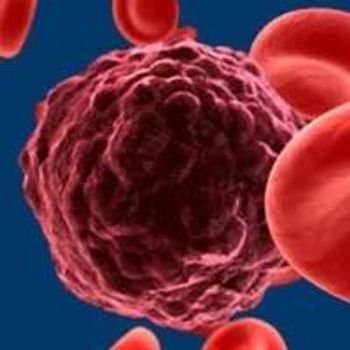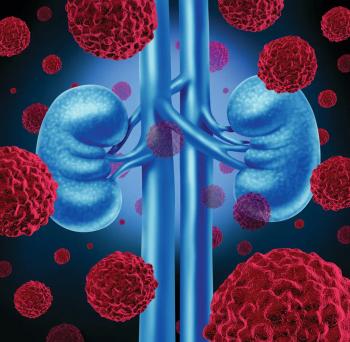
Image-guided intensity-modulated radiotherapy caused less toxicity compared with three-dimensional conformal radiation therapy with no difference in disease outcomes in patients with cervical cancer undergoing postoperative radiation therapy.

Your AI-Trained Oncology Knowledge Connection!


Image-guided intensity-modulated radiotherapy caused less toxicity compared with three-dimensional conformal radiation therapy with no difference in disease outcomes in patients with cervical cancer undergoing postoperative radiation therapy.

The FDA has approved pembrolizumab for the adjuvant treatment of adult and pediatric patients with stage IIB or IIC melanoma following complete resection.

The addition of darolutamide to docetaxel and androgen deprivation therapy resulted in a significant improvement in overall survival compared with docetaxel/ADT alone in patients with metastatic hormone-sensitive prostate cancer, meeting the primary end point of the phase 3 ARASENS trial.

Several Yale Cancer Center faculty have authored chapters in a newly released book, A New Deal For Cancer: Lessons from a 50 Year War.

The FDA has granted priority review to the supplemental biologics license application for luspatercept-aamt for the treatment of anemia in adults with non–transfusion dependent β-thalassemia.

Deborah M. Stephens, DO, discusses her approach to treating a patients with chronic lymphocytic leukemia, how CAR T-cell therapy may fit into the treatment paradigm, and the numerous trials that have shown promise in this space.

The FDA has approved rituximab plus chemotherapy for pediatric patients with previously untreated, advanced stage, CD20-positive diffuse large B-cell lymphoma, Burkitt lymphoma, Burkitt-like lymphoma, or mature B-cell acute leukemia.

Bijal Shah, MD, MS, discussed the results of the ZUMA-3 trial and how this approval will enhance the treatment of patients with relapsed or refractory B-cell precursor ALL.

Lisocabtagene maraleucel significantly prolonged event-free survival and progression-free survival and improved complete responses when used in the second-line treatment of patients with relapsed or refractory large B-cell lymphoma.

Richard D. Carvajal, MD, discusses the need for additional treatment options in patients with rare melanomas, the promise of tebentafusp, and ongoing trials in the pipeline for this patient population.

Deborah L. Toppmeyer, MD, discusses clinical trials involving treatments for HER2-positive and triple-negative breast cancer, as well as the importance of making these trials accessible to all patient populations in an attempt to address disparities.

David L. Bartlett, MD has reopened his Pittsburgh practice and will begin seeing patients at AHN Cancer Institute.

Cleveland Clinic has partnered with Anixa Biosciences, Inc. to open a phase 1 trial examining a vaccine aimed at preventing the development of triple-negative breast cancer.

Secura Bio decided to withdraw the approval of the new drug application for panobinostat for use in combination with bortezomib and dexamethasone to treat select patients with multiple myeloma.

Nasser Khaled Altorki, MD, provides insight on the results of the IMpower010 trial as well as post hoc analyses from the trial and what they signal for the remainder of this patient population.

The FDA has placed a partial clinical hold on the phase 1b KOMET-001 trial, which is examining KO-539 in patients with relapsed or refractory acute myeloid leukemia.

The FDA’s Centers for Devices and Radiological Health has granted a breakthrough device designation to ZetaMet technology for use in the treatment of metastatic bone cancers and osteologic interventions.

The addition of BO-112 to pembrolizumab produced clinical benefit in patients with unresectable malignant melanoma who have experienced disease progression on anti–PD-1 therapy, according to data from the preliminary analysis of the phase 2 SPOTLIGHT-203 trial.

The FDA has approved daratumumab and hyaluronidase-fihj plus carfilzomib and dexamethasone for the treatment of adult patients with relapsed or refractory multiple myeloma who have received 1 to 3 prior lines of therapy.

The FDA has issued a complete response letter to the new drug application seeking the approval of plinabulin in combination with granulocyte colony-stimulating factor for the prevention of chemotherapy-induced neutropenia.

Investigators have known about hereditary diffuse gastric cancer syndrome for decades, but only identified its molecular causes in the 1990s, said gastrointestinal oncologist Bryson Katona, MD, PhD.

Researchers from Rutgers Cancer Institute of New Jersey and Dana-Farber Cancer Institute developed and evaluated a computational pipeline that utilizes information commonly provided in tumor sequencing assays to predict the origin of detected DNA alterations.

Maurie Markman, MD, discusses how agency leaders should be encouraged to improve regulatory science, include a patient’s perspective in approval decisions, reduce unnecessary bureaucracy and costs associated with the conduct of trials, and accelerate the overall review process for drug approval.

Retifanlimab demonstrated encouraging antitumor activity with favorable tolerability in patients with recurrent microsatellite instability–high or mismatch repair deficient endometrial cancer, according to data from the phase 1 POD1UM-101 trial.

The FDA has extended the review period for the new drug application for pacritinib as a treatment for adult patients with intermediate- or high-risk primary or secondary (post-polycythemia vera or post-essential thrombocythemia) myelofibrosis and severe thrombocytopenia with a baseline platelet count of 50 x 109/L.

First-line maintenance treatment with the PARP inhibitor niraparib yielded a clinically meaningful and statistically significant improvement in progression-free survival vs placebo in Chinese patients with platinum-responsive advanced ovarian cancer, regardless of biomarker status, according to data from the phase 3 PRIME trial.

The Japan Pharmaceuticals and Medical Devices Agency has approved the PD-1 inhibitor pembrolizumab for frontline use in combination with 5-fluorouracil plus cisplatin chemotherapy in patients with radically unresectable, advanced, or recurrent esophageal carcinoma.

The combination of pembrolizumab and axitinib demonstrated comparable activity and safety vs sunitinib in Japanese patients vs the global population of patients with newly diagnosed metastatic renal cell carcinoma enrolled in the phase 3 KEYNOTE-426 trial.

The antibody-drug conjugate mirvetuximab soravtansine has shown promising response rates and a favorable toxicity profile in patients with folate receptor alpha-high, platinum-resistant ovarian cancer who have received previous treatment with bevacizumab.

The FDA has granted a priority review designation to a supplemental new drug application for the use of olaparib as adjuvant therapy in patients with BRCA-mutated, high-risk, HER2-negative early breast cancer who have previously received neoadjuvant or adjuvant chemotherapy.